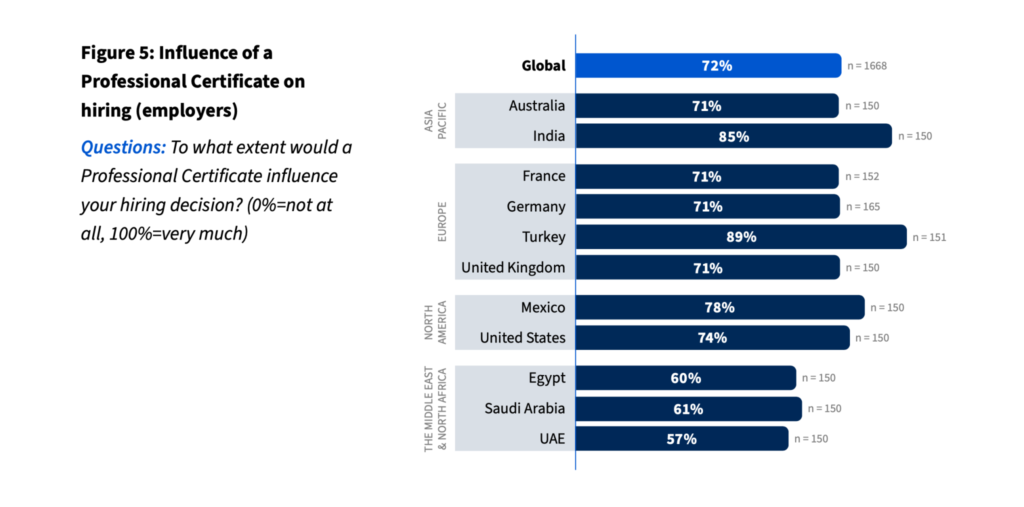In today’s fast-paced and technology-driven world, the landscape of education and professional development is undergoing a significant transformation. Traditional degrees, once the gold standard for academic achievement and career advancement, are increasingly being complemented—and in some cases, surpassed—by more flexible, skill-specific learning credentials. Among the frontrunners of this educational evolution is Coursera credentials, a platform that has not only democratized access to knowledge from top universities and industry leaders but has also tailored its offerings to meet the acute needs of both learners and employers in the contemporary job market. This introduction sets the stage for an in-depth exploration of Coursera’s impact on market recognition, career impact, and a comprehensive cost-benefit analysis, highlighting how Coursera certifications are reshaping the paradigms of learning, employability, and career progression in an ever-changing global economy.

Market Recognition:
Employers and industry pioneers are increasingly valuing Coursera certifications, viewing them as key assets that boost a candidate’s job prospects. The rising interest in industry-specific micro-credentials, like those Coursera offers, mirrors a broader trend in recruitment that favors direct, applicable skills and knowledge over traditional degrees.
Recent findings from Coursera have shown that 61% of employers find soft skills the most challenging to assess during recruitment, with technical abilities a close second at 55%. This underscores a shifting emphasis towards the combination of interpersonal skills and technical know-how in today’s workforce—a focus that aligns perfectly with what Coursera’s certifications aim to develop.
Moreover, the data reveals that 39% of employers have welcomed at least one individual with a microcredential into their teams, marking a clear move towards prioritizing hands-on skills and experience in hiring decisions. Coursera’s Career Academy stands out here, offering specialized micro-credentials crafted alongside giants like Google, IBM, Meta, and Intuit, to ensure learners are primed for the professional world with the essential skills they need.
In a parallel vein, a survey by Futurelearn engaging over 1000 US hiring managers reported that nearly 44% deem online education as “very to extremely” crucial. This sentiment bodes well for online certifications, including Coursera’s, signifying a positive outlook on digital learning credentials among employers. Additionally, the association of the certification with a reputable university often plays a significant role in amplifying its value in the job market.

Career Impact:
Coursera certifications have shown significant positive impacts on career outcomes, including job placement, promotions, and salary increases. These benefits are supported by various case studies and statistics that highlight the value of Coursera’s educational offerings.
For instance, Coursera for Government customers have seen an average job placement increase of 27% due to the certifications they obtained through Coursera. This improvement is attributed to the quality of the online skill development programs offered by Coursera, which are particularly valuable during times of economic uncertainty or when there is a high demand for digital skills .
Learners have reported significant career benefits from Coursera certifications, including increased confidence to switch fields, more opportunities for promotions, and a higher number of interviews secured. This indicates that Coursera certifications not only enhance job prospects but also contribute to career advancement and job security.
Furthermore, a 2021 survey revealed that 75% of Google Career Certificate Graduates in the United States reported improvements in their career trajectory within six months of completing their certificate. These improvements ranged from securing a new job or career to receiving a promotion or salary raise. This data is supported by research from the Bureau of Labor Statistics (BLS), which found that professionals with certifications or licenses faced lower levels of unemployment and earned more on average than those without such credentials.
In terms of salary increases, adding relevant certifications to one’s résumé can potentially lead to higher earnings, with studies showing salary increases ranging from 5% to 20%, depending on the industry and demand for the certification. For example, employees who earn the Google Professional Cloud Architect certification earn an average of $139,529, highlighting the lucrative potential of certain certifications .

Cost-Benefit Analysis:
When comparing the cost-benefit analysis of Coursera certificates to traditional education and other online platforms, several key points emerge:
- Cost Comparison:
- Coursera provides a wide array of learning paths, from individual courses to specialized programs and degrees, with prices varying based on the course and certification choice. Individual course prices range from $49.99 to $300, with the option of a Verified Track for certification. Coursera also offers a monthly subscription at $59 and an annual subscription for $399, granting unlimited access to its extensive course library.
- Value Against Traditional Education:
- While traditional education offers valuable in-person interactions and a structured learning environment, it often comes with a high tuition cost that can be prohibitive for many. In stark contrast, Coursera presents a cost-effective alternative. The platform’s courses, even those leading to professional certificates or degrees, are offered at a fraction of the cost of traditional college tuition. This price difference is significant, especially considering the potential for thousands of dollars in savings when opting for Coursera’s flexible and diverse learning options. Beyond cost savings, Coursera offers the flexibility to learn at one’s own pace and the unique opportunity to access courses from leading universities around the world. This makes Coursera an attractive option for individuals seeking to enhance their skills, advance their careers, or explore new fields without the substantial financial investment traditionally associated with higher education.
- Comparison with Other Online Platforms:
- Like Coursera, edX is another leading online learning platform offering a broad selection of courses and certifications with varying prices. While edX does not provide a subscription model, it allows access to an extensive range of courses from top academic and industry partners. The pricing for individual courses on edX varies, including free auditing options and paid certifications, accommodating diverse learning needs and budgets.




